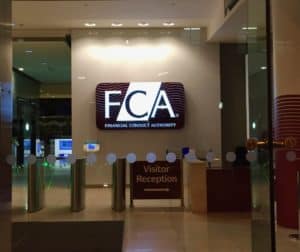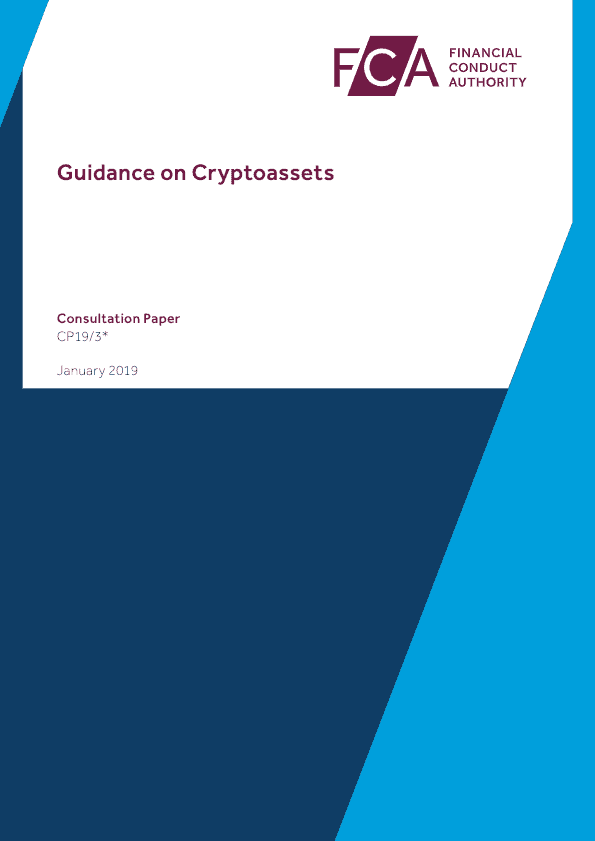The UK Financial Conduct Authority (FCA) issued a consultation today on the emerging “cryptoasset” sector of finance. The UK is well known for its thoughtful regulatory approach when it comes to innovative new financial services and the final outcome will be watched with interest around the globe.
The cryptoasset consultation is also part of the UK Cryptoasset Taskforce’s recommendation that the FCA provides additional guidance on the regulatory perimeter. The Taskforce published a report last October.
 Christopher Woolard, Executive Director of Strategy and Competition at the FCA, commented on the consultation:
Christopher Woolard, Executive Director of Strategy and Competition at the FCA, commented on the consultation:
‘This is a small but growing market and we want both industry and consumers to be clear what is regulated, and what isn’t. This is vital if consumers are to know what protections they’ll benefit from and in ensuring we have a market functioning as it should.”
In a release, the FCA said the numbers regarding crypto remain relatively small but more consumers are investing in these digital assets.
Today, within the UK there are less than 15 cryptocurrency exchanges in operation out of a global total of about 231. Out of these exchanges in the UK, only 4 produce daily trading volume in excess of $30 million with aggregate daily trading volume of just $200 million for the group.
There are currently over 2,000 exchange and utility tokens in the market reports the agency. The FCA notes that in 2018 initial coin offerings (ICOs) saw a significant reduction in capital raised in compared to 2017. Global ICO funding was $65 million in November 2018, compared to over $823 million in November 2017.
The FCA estimates that there are 56 projects in the UK that have used ICOs, accounting for less than 5% of projects globally.
 The FCA has previously issued warnings regarding the risk to consumers affiliated with investing in cryptoassets. About 78% of ICOs in 2017 were labeled scams. Yet the agency continues to pursue an important policy of ensuring competition in financial services – IE challenges to traditional finance – while providing sufficient investor protection.
The FCA has previously issued warnings regarding the risk to consumers affiliated with investing in cryptoassets. About 78% of ICOs in 2017 were labeled scams. Yet the agency continues to pursue an important policy of ensuring competition in financial services – IE challenges to traditional finance – while providing sufficient investor protection.
The FCA states that publishing guidance should “reduce legal uncertainty and assist firms to develop legitimate cryptoasset activities and business models.” The intent is to “improve participation in the cryptoasset market and competition in the interest of consumers.”
Overall, the UK’s regulatory approach has been lauded around the world for fostering a robust Fintech ecosystem. Digital assets may be the most challenging project associated with the regulator’s portfolio of regulatory objectives.
Drawing the Line.
Most every crypto industry participant recognizes the need for bright-line rules to engender a successful sector of finance. Clear guidance has been missing in much of the world with some jurisdictions choosing to regulate via enforcement actions. Once guidance is finalised expectations are that it will be clear what is regulated by the FCA – and what is not.
Cryptoassets are a cryptographically secured digital representation of value or contractual rights that is powered by forms of DLT and can be stored, transferred or traded electronically. Examples of cryptoassets include Bitcoin and Litecoin (which we categorise as exchange tokens), as well as other types of tokens issued through the Initial Coin Offerings (ICOs) process (which will vary in type).
The Consultation states:
“The final Guidance will enable firms to understand whether certain cryptoassets fall within the regulatory perimeter. This should allow firms to have increased certainty around their activities while meeting our own regulatory objectives of consumer protection, enhancing market integrity and promoting effective competition in the interest of consumers. We encourage firms to seek expert advice if you are unsure whether the products you offer fall within the regulatory perimeter.”
The FCA has defined three different types of cryptoassets:
- Exchange tokens: these are not issued or backed by any central authority and are intended and designed to be used as a means of exchange. They are, usually, a decentralised tool for buying and selling goods and services without traditional intermediaries. These tokens are usually outside the [FCA] perimeter.
- Security tokens: these are tokens with specific characteristics that mean they meet the definition of a Specified Investment like a share or a debt instrument as set out in the RAO, and are within the [FCA] perimeter.
- Utility tokens: these tokens grant holders access to a current or prospective product or service but do not grant holders rights that are the same as those granted by Specified Investments. Although utility tokens are not Specified Investments, they might meet the definition of e-money in certain circumstances (as could other tokens), in which case activities in relation to them may be within the [FCA] perimeter.
Exchange tokens, such as Bitcoin, are not considered to be money by either the FCA nor the Bank of England as these assets are simply too volatile to be considered a store of value, and, at least currently, are not widely accepted as a medium of exchange. Stablecoins are also considered to be exchange tokens yet the FCA adds that Stablecoins can be securities as well.
So where does the FCA seek to draw the line for security tokens?
Within the consultation, the FCA indicates that whether the token is transferable and tradeable on cryptoasset exchanges or any other type of exchange or market, this may be indicative that a token is a “Specified Investment” – thus a security. Simultaneously, the consultation states:
“Much like exchange tokens, utility tokens can usually be traded on the secondary markets and be used for speculative investment purposes. This does not mean these tokens constitute Specified Investments.”
The consultation includes several examples of what is, and what is not, a utility token.
This question may garner considerable interest from industry participants. The FCA says “the more decentralised the network the less likely it is that the token will confer enforceable rights against any particular entity, meaning it may not confer the same or equivalent rights as Specified Investments.”
In Europe, several jurisdictions have pursued, or are pursuing regulations that are viewed as supportive of crypto. France expects to enact law in early 2019 that defines their regulatory approach to crypto. The FCA has most certainly reviewed the proposed French regulation.
The Cryptoasset Consultation is open to feedback until Friday 5 April 2019. Stakeholders may submit responses via email to fcacrypto@fca.org.uk.
Final Guidance on the existing regulatory perimeter in relation to cryptoassets will be published “no later than summer 2019.”
Download FCA Guidance on Cryptoassets here.



